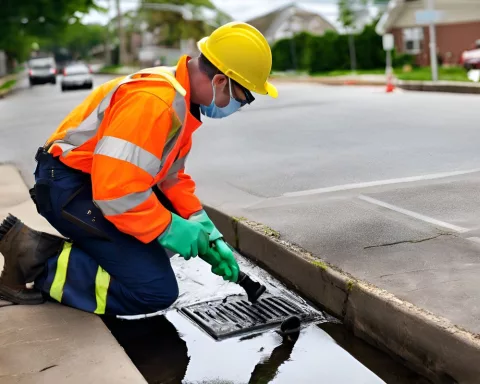South Africa’s Department of Human Settlements has praised Limpopo Provincial Government for its efforts in championing economic empowerment among youth and women contractors. Limpopo’s Human Settlement Development Grant (HSDG) has redeemed its reputation in the current fiscal year, surpassing expectations. The Limpopo Department of Human Settlements has ensured that a minimum of 40% of the value of housing projects is dedicated to certain groups; up to 62% of the value of these projects has been apportioned to these groups, effectively revolutionizing the sector. The Department aims to provide quality, affordable housing to all South Africans.
South Africa’s Department of Human Settlements has praised the Limpopo Provincial Government for its efforts in championing economic empowerment among youth and women contractors. Limpopo’s Human Settlement Development Grant (HSDG) has redeemed its reputation in the current fiscal year, surpassing expectations. The Limpopo Department of Human Settlements has ensured that a minimum of 40% of the value of housing projects is dedicated to certain groups; up to 62% of the value of these projects has been apportioned to these groups, effectively revolutionizing the sector.
Commendation for Economic Empowerment Efforts
South Africa’s Department of Human Settlements head, Minister Mmamoloko Kubayi, has recently praised the Limpopo Provincial Government for its efforts in championing economic empowerment among youth and women contractors. This acknowledgment is deeply rooted in the continual strive to cultivate sustainable human settlements within the provincial boundaries.
In previous periods, Limpopo’s Human Settlement Development Grant (HSDG) witnessed a mid-term reduction due to underperformance. Nonetheless, the province has significantly redeemed its reputation in the current fiscal year, surpassing expectations. Minister Kubayi has hailed this remarkable improvement as a guiding light for the sector, underlining the criticality of adequate human resources, vigilant monitoring, and proficient service delivery.
The Limpopo Department of Human Settlements has consistently ensured that a minimum of 40% of the value of housing projects is dedicated to certain groups. Impressively, up to 62% of the value of these projects has been apportioned to these groups, thereby effectively revolutionizing the sector.
Housing Handover and Future Objectives
Minister Kubayi’s commendations were imparted during a housing handover event at Spa Park, Extension 25, Bela-Bela, in Limpopo. The houses were built by a female contractor as part of the Informal Settlements Upgrading Programme (ISUP)—a project that is aimed at improving the living conditions of those residing in informal settlements. One of the recipients, a 70-year-old pensioner named Ela Bodiba Thobane, expressed profound gratitude for her new residence.
This handover represents a key advancement towards Limpopo’s housing units target of over 7000 in the 2023/2024 period. The handover event was followed by the year’s final meeting between the Ministry and the MECs of Human Settlements (MINMEC).
Key issues discussed during the meeting included the allocation of State land for human settlements development, the Title Deeds Restoration Project, the identification of disaster-prone informal settlements, and the prompt payment of service providers. Around 2500 hectares of land have been allocated for the Department of Human Settlements’ housing projects, including social housing, affordable housing, informal settlements upgrading, and fully subsidized housing known as Breaking New Ground (BNG).
Concerns and Future Strategies
However, the minister expressed concern over the underperformance of provinces and metropolitan municipalities in the Informal Settlement Upgrading Programme. She expressed disappointment at the lack of fundamental human rights services for many residents of informal settlements, despite the allocation of grants for these services. As a resolution to these performance issues, the Minister plans to organize meetings with Metropolitan Municipalities’ Troikas, MMCs for Human Settlements, and senior officials.
The Human Settlements Sector has experienced mid-term budgetary cuts. Nevertheless, it was agreed at the MINMEC meeting that underperforming provinces should develop immediate recovery plans in conjunction with the National Department. This strategy would prevent Provinces and Metros from exceeding their approved business plans and budgets, thereby avoiding potential financial losses to the National Treasury.
Significant improvement has been noted in the punctual payment of invoices, ensuring that contractors abide by project schedules. The MINMEC also commended the substantial improvement in the 40% allocation for designated groups in grant-funded projects, with Limpopo, KwaZulu-Natal, and North West excelling in their endeavors.
The Title Deeds Fridays Campaign, launched last month, has also made significant progress, with approximately 15,371 title deeds distributed to beneficiaries since its inception. However, there are still matters of concern. The quality and safety of homes built before the establishment of the National Home Builders Registration Council (NHBRC) and the implementation of Norms and Standards are under review. A nationwide assessment is in the pipeline to evaluate these homes, and remedial measures are set to be announced in the following weeks.
Moreover, technical teams have been assigned the task of finding policy-compliant solutions for Khutsong residents in Gauteng, whose homes are located in sink-hole prone areas. These solutions might consist of identifying alternative land for relocation or providing serviced sites and subsidies within the permissible quantum.
Through these endeavors and initiatives, the Department of Human Settlements is making significant strides towards sustainable development and economic empowerment. The journey is far from conclusion, but with ongoing collaboration and diligence, the vision of providing quality, affordable housing to all South Africans is gradually turning into a tangible reality.
1. What is the Informal Settlements Upgrading Programme (ISUP)?
The Informal Settlements Upgrading Programme (ISUP) is a project aimed at improving the living conditions of those residing in informal settlements in South Africa.
2. What percentage of the value of housing projects is dedicated to certain groups by the Limpopo Department of Human Settlements?
The Limpopo Department of Human Settlements has consistently ensured that a minimum of 40% of the value of housing projects is dedicated to certain groups, with up to 62% of the value of these projects being apportioned to these groups.
3. What was discussed during the year’s final meeting between the Ministry and the MECs of Human Settlements (MINMEC)?
During the year’s final meeting between the Ministry and the MECs of Human Settlements (MINMEC), key issues discussed included the allocation of state land for human settlements development, the Title Deeds Restoration Project, the identification of disaster-prone informal settlements, and the prompt payment of service providers.
4. What is the Title Deeds Fridays Campaign?
The Title Deeds Fridays Campaign is an initiative launched by the Department of Human Settlements in South Africa aimed at distributing title deeds to beneficiaries. Approximately 15,371 title deeds have been distributed to beneficiaries since its inception.
5. What is the concern expressed by the minister over the underperformance of provinces and metropolitan municipalities in the Informal Settlement Upgrading Programme?
The minister expressed concern over the underperformance of provinces and metropolitan municipalities in the Informal Settlement Upgrading Programme. She expressed disappointment at the lack of fundamental human rights services for many residents of informal settlements, despite the allocation of grants for these services.
6. What is the National Home Builders Registration Council (NHBRC)?
The National Home Builders Registration Council (NHBRC) is a regulatory body in South Africa responsible for the quality assurance of new homes built for public use.








